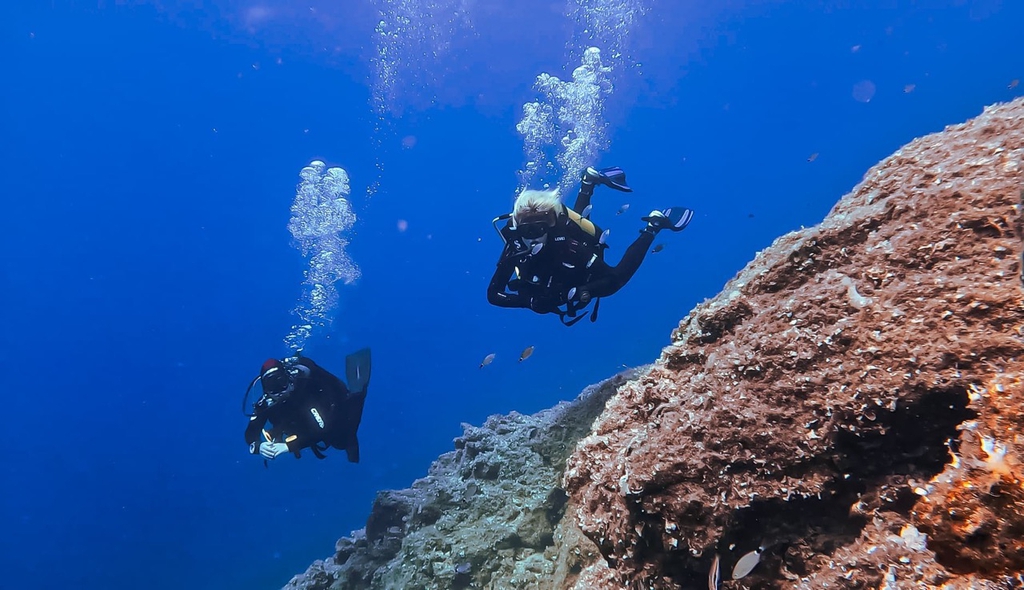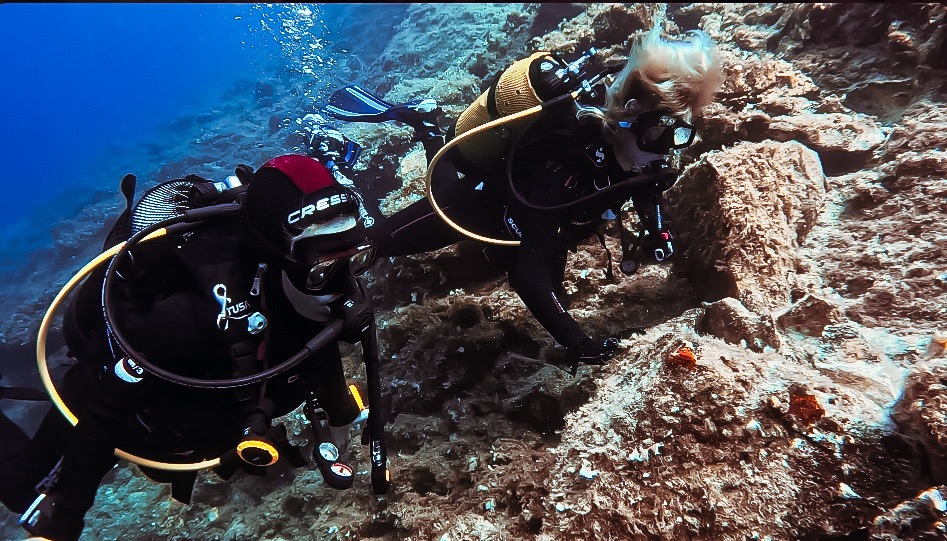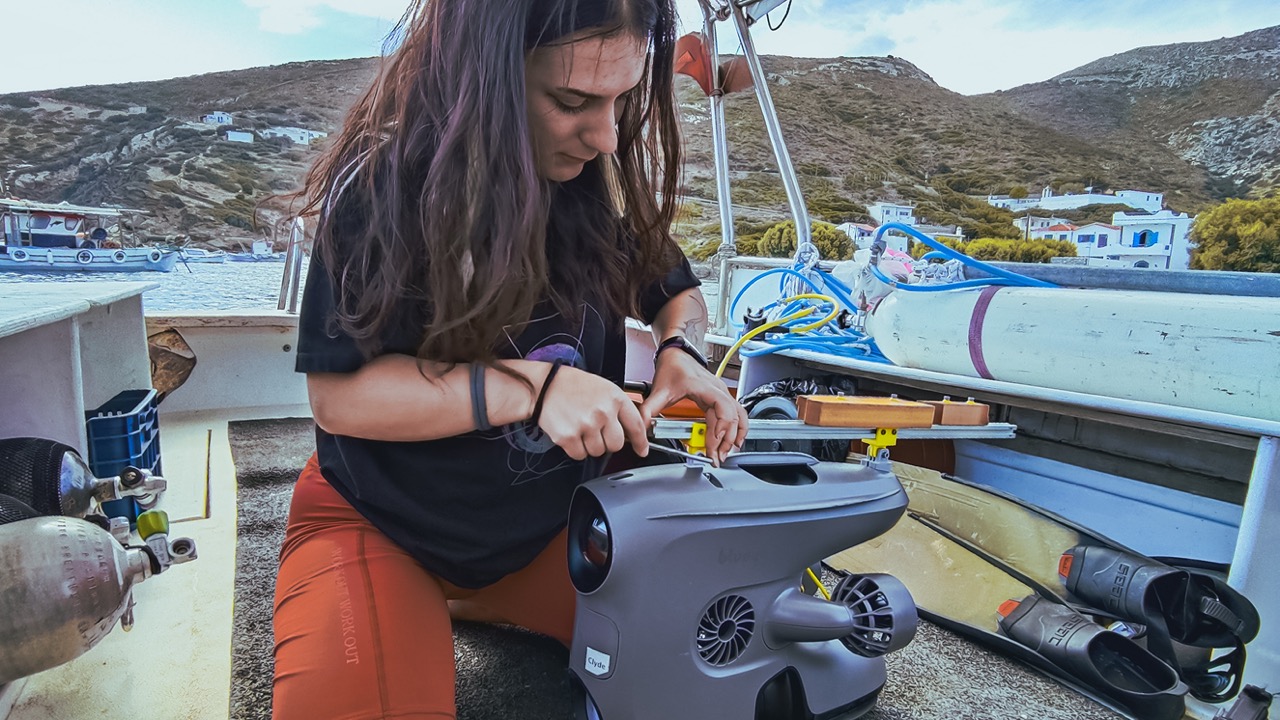How do you think the internship has been this far?
- It has been a good introduction to how the university works and how academic life is here. I've met a lot of people from different fields. I have also attended some courses related to what I'm interested in, like Analysis of Past Technology and GIS, Friday seminars and an institute conference - and mostly getting accustomed to Nordic archaeology.
Her current tasks consist of writing an article on her master's thesis, that will probably result in a publication, and honing her GIS skills to be able to contribute to the research of other academics and to assist them in their papers.
Theofano’s skills and education include both previous courses and archaeological fieldwork on maritime archaeology. She has been scuba diving for a few years, and in September, for the first time, she got the chance to be on an underwater excavation and see various shipwrecks in the Fourni Islands, in the Aegean Sea. Here she was cleaning up sectors of the shipwrecks, doing underwater survey, taking underwater photographs and collecting and documenting finds.

She is interested in everything that relates to underwater research or maritime archaeology, a very broad subject spanning from coastal archaeology to ship imagery. Although, she does have a specific interest within the field:
- I'm mostly keen on shipbuilding. I also wrote my master thesis on the longship and how it acted as a symbol of power and status during the Viking Age so I'm really interested in anything relating to maritime subjects.
Nevertheless, Theofano’s skills are not limited to maritime archaeology, as she has also participated in land-based excavations. One of them was an Archaic-Classical shrine/settlement at the hill of Lathouriza (the municipality of Vari, Athens). Here she cleaned the excavation area and kept a daily archaeological journal, as well as collecting, cleaning, and cataloguing finds.
What brought you to this internship and what was the process of getting it?
- Well, apart from practical experience in the field, I also really like theoretical research, so I want to gain more experience in participating in a group and collaborating with other archaeologists for a group research, archaeological research, and produce a research paper. I'm also really interested in higher education, so I wanted to have an internship at an academic institution and see the routines, daily life, and work behind the university and how it works.
For Erasmus internships, you can freely apply to any institution related to your field of study. She shares a bit about the process of getting it:
- With proper preparation and good time management, the process was relatively easy, and the staff from both my home university and UiO were exceptionally helpful and willing to guide me through it. I should emphasize that the process is easy when it comes to discovering the institute you like and applying to them, however, there is a lot of paperwork included and it is best to get a start on it as soon as possible. Other than that, it is an exciting journey!
Do you have any relevant coursework or academic projects that you believe best prepared you for the internship?
- Well during my master's program, mostly, I had the opportunity to familiarize myself with different approaches in archaeology, like social anthropology, gender studies, and more practical experience and tools, like archaeological drawing, GIS and total station mapping for excavational purposes.
In other words, getting to know a variety of both theoretical and methodological approaches has been beneficial, and is something she also recommends other students doing:
- […] to see how you can use different theoretical methods and different practical methods to pursue a subject you want, and write a research paper on it. So, to have both a theoretical background and the data in some kind of visual form.

Lastly, we talk a bit about the role of heritage and archaeology in general:
- I think one of the main points of heritage and archaeology is to understand ourselves, as an individual and as a community. They help us preserve the past, and thus human evolution and development; understand the present, and thus our cultural identity. Through this process, they also shape our future, by creating a mutual understanding and appreciation for cultural diversity, connecting us to our shared human heritage.
In the future Theofano wants to do her own research and is thinking about pursuing a PhD, but she would also love to do more fieldwork to gain more practical knowledge. She also has a clear view of how the current internship is helping her achieving her goals:
- I think that it is already bettering my understanding in Nordic archaeology in general, and it helps me get more familiar with new interpretation and perspectives when it comes to approaching a subject. Because it's one thing to have data and catalogue artifacts and all those practicalities, and it's another thing to be able to interpret them and figure out what they mean; what the context is. So, I already feel that this is helping a lot. It is also a great chance to grow a social and professional network.
At the end, she recommends students of archaeology to gain experience, to always be curious and to keep an eye out for opportunities - or to seek and create your own through internships or fieldwork:
- anything you can get your hands on because it will always give you something. Even if you feel that it's not 100% related to what you want right now, you may discover that it gives you some “round” information. Some practical experience with working with other people or exploring different interests. It's all life experience in the end, so it will assist you both in your life in general getting out there and being exposed to different information, and it will most likely give you a clearer view on if you're doing something right or if you should look for something that you didn't notice that much before.

